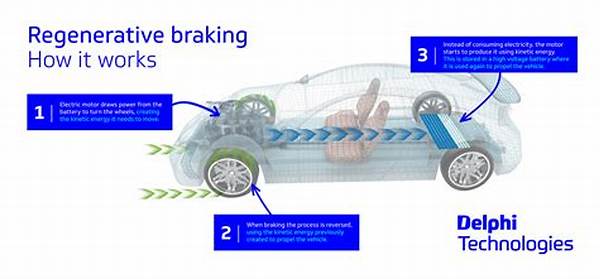
Electric Vehicle Regenerative Brake Failure
The world is swiftly steering towards an electric future, grounded in the promise of sustainability and innovation—electric vehicles (EVs) are leading the charge. However, even these cutting-edge machines are not immune to challenges. Electric vehicle regenerative brake failure is a pressing issue that could potentially impact their safety and efficiency. It’s crucial to understand the nuances of this failure to not only safeguard our investments but also ensure the safety of our roads. Let’s delve deeper into how this failure can impact the future of green transportation.
Read Now : Integrated Safety Features In Ev Brakes
Understanding the Complexity of Regenerative Brake Systems
Regenerative braking is a revolutionary system that allows electric vehicles to harness energy typically lost during braking. Instead of evaporating into thin air as heat, it converts and stores these energy bursts, enhancing the vehicle’s efficiency. However, when electric vehicle regenerative brake failure occurs, this process is compromised. Faulty regenerative brakes can lead to increased stopping distances, posing significant safety concerns. For EV owners, grasping the complexity of these systems isn’t just a pursuit of curiosity—it’s a liability mitigator. Not only does understanding these failures safeguard personal investments, but it also ensures our shared aspirations for a sustainable future remain intact. With regenerative brakes at the center of the green revolution, prioritizing their maintenance is paramount.
Implications of Electric Vehicle Regenerative Brake Failure
1. Safety Hazards: The main concern with electric vehicle regenerative brake failure is the potential safety risk. A failure in this critical system can lead to increased braking distances, potentially resulting in collisions.
2. Efficiency Loss: When regenerative braking systems malfunction, energy recovery is compromised. This inefficiency means vehicles must rely more on traditional braking systems, diminishing the overall energy efficiency of the electric vehicle.
3. Increased Wear and Tear: With a failed regenerative system, mechanical brakes endure more stress. This not only leads to increased maintenance costs but can also shorten the lifespan of braking components.
4. Consumer Trust: The promise of electric vehicles is intertwined with advanced technology. Electric vehicle regenerative brake failure can undermine consumer confidence, deterring potential buyers the shift to green vehicles.
5. Environmental Impact: Inefficient braking systems can hamper an EV’s environmental benefits. Ensuring the proper functioning of regenerative brakes is essential for maintaining the green promise of electric vehicles.
Foreseeing and Mitigating the Risks
The importance of addressing electric vehicle regenerative brake failure cannot be overstated. The failure of these systems doesn’t just spell trouble for individual car owners but could ripple through the fabric of sustainable transportation goals. If people shun electric vehicles owing to reliability concerns, the dream of mass EV adoption may dim significantly. Manufacturers and stakeholders in the automotive industry need to heighten their focus on fail-safe engineering and routine maintenance schedules. Only by doing so can the associated risks be mitigated, ensuring safety and reliability at the core of this innovation. Furthermore, by actively involving communities and raising awareness, we create an ecosystem where EV safety is prioritized.
Read Now : Recommended Automotive Socket Sets
Industry and Regulatory Measures
Industry stakeholders should rally together to combat electric vehicle regenerative brake failure by refining technologies and updating safety protocols. By embracing collaboration over competition, the auto industry can develop robust and adaptive braking systems. Government agencies need to complement these efforts with updated standards and regulations. With policies that mandate routine checks and stricter safety adherence, both the industry and consumers stand to benefit. Enthusiasts and skeptics alike will find common ground as safety and efficiency collectively advance, validating the viability of EVs for mass adoption.
Systems and Safety in Electric Vehicles
The safety net created by traditional braking systems is indispensable, but regenerative brake systems remain integral to the EV narrative. They complement the primary systems but provide a significant edge in efficiency and eco-friendliness—until a failure occurs. Electric vehicle regenerative brake failure paints a stark picture of malfunctioning systems that skew the balance of safety and efficiency. Such failures can temporarily obscure the progress made to date, but they are also a clarion call for more stringent oversight and comprehensive safety evaluations. Manufacturers and consumers alike need to be vigilant; through awareness and proactive measures, the promise of electric vehicles can be fully realized.
Ongoing Challenges and Solutions
Navigating through the challenges of electric vehicle regenerative brake failure, one must keep an eye on futuristic solutions that pave the pathway for reliability. Innovations such as self-diagnosing brake systems or automated alerts empowering drivers with real-time data could prove revolutionary. Enabled by AI, such solutions can preemptively address potential brake failures, ensuring optimal performance even when nature and technology collide. Moreover, investing in constant research and development will continue to refine regenerative braking technologies, making them more robust and user-friendly, enhancing both longevity and consumer trust.
Conclusion
In summary, while electric vehicle regenerative brake failure poses considerable challenges, they are not insurmountable. Collaborative industry efforts, proactive consumer education, and diligent regulatory oversight can all work together to make these issues manageable. Electric vehicles represent a cornerstone of a sustainable future, and addressing these failures head-on is an essential step to solidifying their place on our roads. By persevering and focusing on innovation and safety, the resilience of electric vehicles can not only withstand setbacks but can emerge stronger, steering society closer to a greener future.